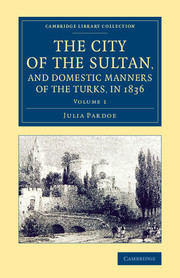Description
The City of the Sultan, and Domestic Manners of the Turks, in 1836
The City of the Sultan, and Domestic Manners of the Turks, in 1836 2 Volume Set Series
Author: Pardoe Julia
This two-volume work, published in 1837, gives a lively and observant account of life in the declining Ottoman empire.
Language: English
Subject for The City of the Sultan, and Domestic Manners of the...:
Approximative price 48.38 €
In Print (Delivery period: 14 days).
Add to cart
Publication date: 03-2015
Support: Print on demand
Support: Print on demand
Description
/li>Contents
/li>
Julia Pardoe (1804?62) was famous for her historical biographies (some of which are also reissued in the Cambridge Library Collection), but this two-volume work, first published in 1837, arose from a visit to Turkey made by Pardoe and her father in 1836. It was very successful, with new editions appearing over the next twenty years, while Pardoe was considered to be second only to Lady Mary Wortley Montagu among female writers on Turkey. Attempting to give her readers 'a more just and complete insight into Turkish domestic life, than they have hitherto been enabled to obtain', in Volume 1 Pardoe describes the inhabitants of Istanbul, both the Ottoman governing elite and the expatriate community of Greeks, Italians, Russians and French, with their constant political intrigues. Her lively and observant account of life in the declining but still powerful Ottoman empire remains of great interest.
Preface; 1. The Golden Horn; 2. Difficulty of ingress to Turkish houses; 3. Turning dervishes; 4. Merchants of Galata; 5. The Greek carnival; 6. Difficulty of obtaining an insight into Turkish character; 7. The harem of Mustafa Effendi; 8. Bath-room of Scodra Pasha; 9. Cheerful cemeteries; 10. Character of Constantinopolitan Greeks; 11. The Kourban-Baïram; 12. The military college; 13. Invitation from Mustapha Pasha of Scodra; 14. Procession of betrothal; 15. Fine scenery; 16. Turkish superstitions; 17. Imperial invitations; 18. Kahaitchana; 19. Easter with the Greeks; 20. Feasting after fasting; 21. High street of Pera; 22. The mosques at midnight; 23. Antiquities of Constantinople; 24. Balouclè; 25. Figurative gratitude of the Seraskier Pasha; 26. Repetition; 27. Succession of banquets; 28. Monotonous entertainments; 29. The bridal day; 30. A new rejoicing.
© 2024 LAVOISIER S.A.S.




